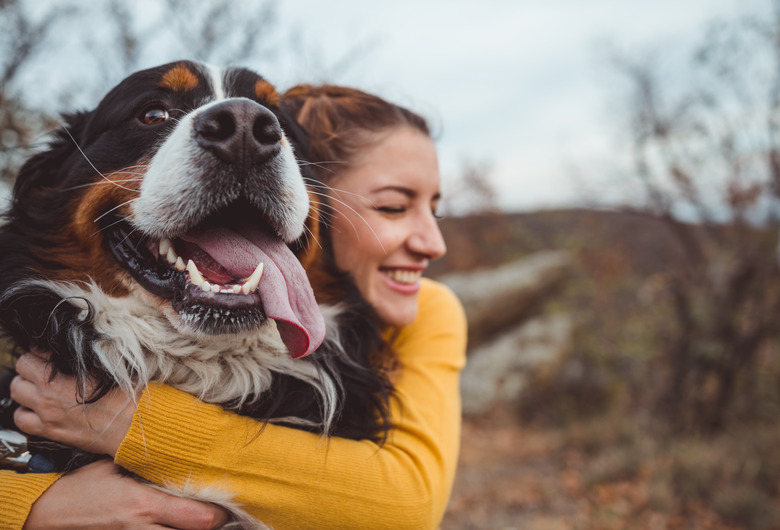Why Do Humans Love Dogs?
Dogs are considered a human's best friend because they love us (and not just because we feed them), and we love them — but why? Humans love dogs because the relationship mimics the bond between a parent and child. The love felt between a human and dog is also hormonal — from oxytocin, to be specific.
On the dog's side of the relationship, the reasons they love us seem obvious: We feed them, shelter them, and generally shower them with cuddles and affection. It's also become part their sociable nature to want to spend time with us and communicate with us. Learn what science has to say about why we love our dogs so darn much and why they love us too.
Why do humans love dogs?
Why do humans love dogs?
Scientists have studied the bond between humans and their furry best friends a lot, and some studies have examined whether oxytocin is released in humans or dogs when they interact. Oxytocin is a hormone produced in our bodies that plays a role in social bonding, especially between a mother and child and between romantic partners.
One study reported in The Telegraph examined positive interactions between dogs and their humans. The researchers noted every interaction, from loving gazes to playful pets, and then tested the urine of both the humans and the dogs. They found that increased eye contact was correlated with more oxytocin in both humans and dogs, suggesting a familial-type bond between the two. When the same test was run with domesticated wolves, the oxytocin levels didn't rise, meaning that this phenomenon was unique to the dog-human bond.
When did humans start to love dogs?
When did humans start to love dogs?
Obviously, the human and dog relationship goes back a very long way. How far back? Somewhere between 13,000 and 30,000 years ago, according to scientific analysis of wolf and dog genes, but our true love affair with dogs seems to have begun around 14,000 years ago.
It's around this time when dogs were buried next to their humans as a show of respect and were featured in their ancient artwork. Some skeletons of the dogs found even showed signs of care when the dogs were ill for an extended period of time, meaning that humans specifically tried to nurse them back to health. Ancient humans even left gifts for their dogs with their burials, which is a sign of affection. This is a bond that continues to this day.
Why do humans and dogs bond so well?
Why do humans and dogs bond so well?
Although dogs share most of their DNA with their wolf ancestors, they have developed special genes that promote sociability similar to those linked to sweetness in humans. Dogs are also really good communicators with humans. That's because they will use their expressions to convey their emotional state and needs to their humans when the people are specifically paying attention to them.
Humans bond with dogs so well that some of them actually do love dogs more than people. In fact, in a study reported by Brill, it seems that people felt more empathy to puppies, adult dogs, and human babies than to adult humans who were suffering or abused based on fake newspaper stories. They also tended to donate more to dog-related charities than human ones.
Do dogs love humans?
Do dogs love humans?
As if you didn't have enough reasons to love dogs, you can rest assured that your dog loves you too. In fact, dogs will go out of their way to rescue you if they feel you are in trouble. That's what one study reported by Arizona State University Canine Science Collaboratory showed when owners were trapped in large boxes.
During the study, their dogs would stop at nothing to release them, especially if the owners sounded distressed. Scientists found that this demonstrated an empathetically motivated behavior on the part of the dogs.
In addition to trying to rescue their humans, dogs also regularly show love and affection toward their people by getting excited when they hear their name, cuddling with them, bringing them their favorite toys, and even herding them. So, if your pup brings you his favorite toy, be sure to give him some extra love in return.
References
- The Telegraph: Humans Love Pet Dogs as Much as Their Children and the Feeling is Mutual
- Current Biology: Ancient Wolf Genome Reveals an Early Divergence of Domestic Dog Ancestors and Admixture into High-Latitude Breeds
- Arizona State University Canine Science Collaboratory: Pet Dogs (Canis lupus familiaris) Release Their Trapped and Distressed Owners: Individual Variation and Evidence of Emotional Contagion
- The Washington Post: Dear Science: Why Do We Love Our Pets?
- Brill: Are People More Disturbed by Dog or Human Suffering?
- New York Post: Humans Love Dogs More than Other People: Study
- Leiden University: Emotional Bond Between Humans and Dogs Dates Back 14,000 Years
- Time: Why Dogs and Humans Love Each Other More Than Anyone Else
- Scientific Reports: Human Attention Affects Facial Expressions in Domestic Dogs
- Insider: 11 Surprising Ways Your Dog is Showing that They Love You, According to Veterinarians
